Trusting God to Fill the Gap: Rodeo Stars Tyson Durfey (w/ wife Shea Fisher) and Cody Custer
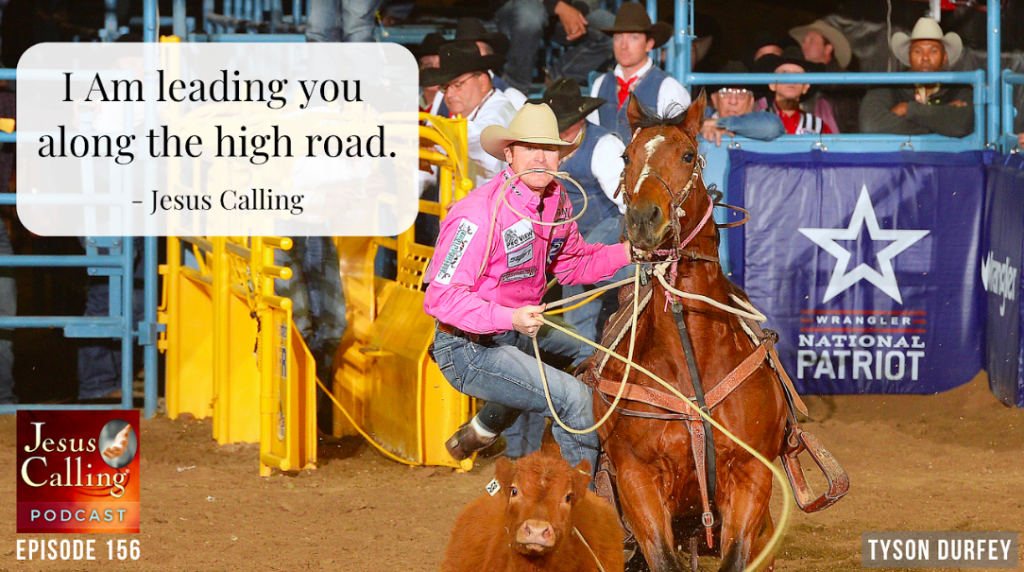
Tyson: Everything that happens, [it] happens for a reason, and sometimes you have to be put through the fire so you can be refined.
Trusting God to Fill the Gap: Rodeo Stars Tyson Durfey (w/ wife Shea Fisher) and Cody Custer – Episode #156
Narrator: Welcome to the Jesus Calling Podcast. Our guests both have rich legacies in the world of Western sports and know the highs of winning but also have felt the sting of defeat, and share how God walked with them through it all: world champion rodeo athlete Tyson Durfey and his wife, country music artist Shea Fisher, and former champion bull rider Cody Custer.
When cowboy Tyson Durfey met Australian country music artist Shea Fisher, he knew Shea was the woman he was supposed to marry, but Tyson didn’t know how much Shea’s love for him and for God would ultimately change his life. Over the years, as Tyson and Shea have grown in their marriage and their spiritual walk, they’ve relied on God to carry them through some of their toughest moments, especially when they couldn’t see the way forward.
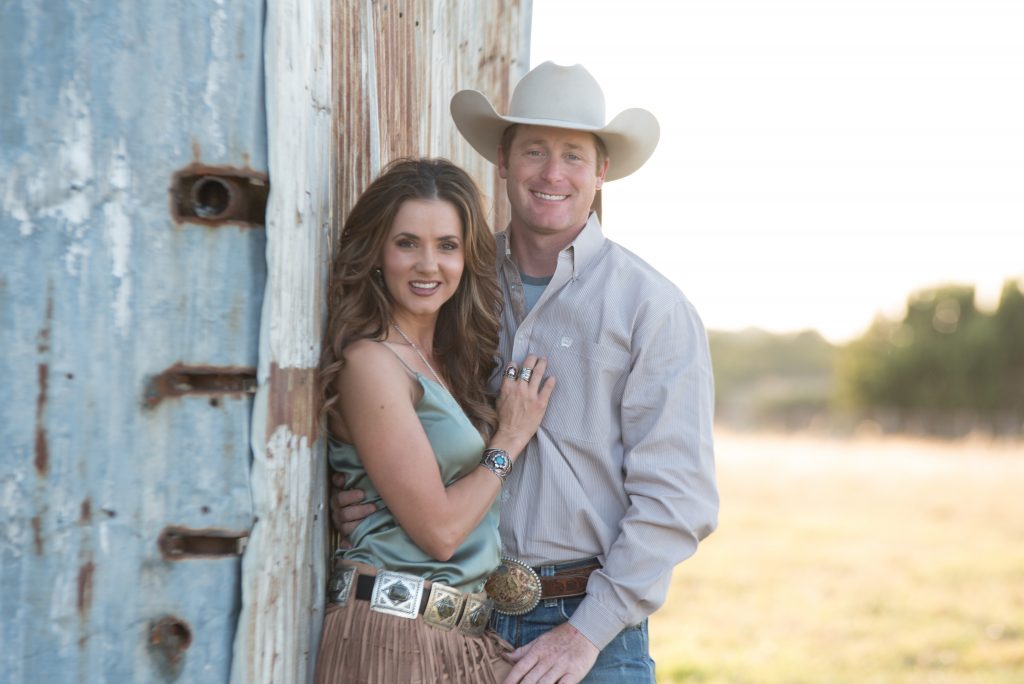
Tyson: I’m Tyson Durfey. First and foremost, I’m a Christian. Other than that, I’m a world champion rodeo athlete. I’m a husband. I’m a father. And I’m a cowboy.
Shea: And I am Shea Fisher Durfey. I am Tyson’s wife. I’m partly Australian, I guess, now that I live in the US. So I’ve been here now for 10 years, born and raised in Australia. I grew up in a rodeo family, and I branched into music so I moved to Nashville in 2009. I met this handsome cowboy, and it brought me to Texas. So I’m Nashville, Texas, and Australia, all put in one.
Growing Up in the Rodeo World—on Two Continents
Tyson: I grew up on a ranch in Savannah, Missouri. It’s in the northwest corner of Missouri, where Jesse James used to ride and rob banks and do all that stuff.
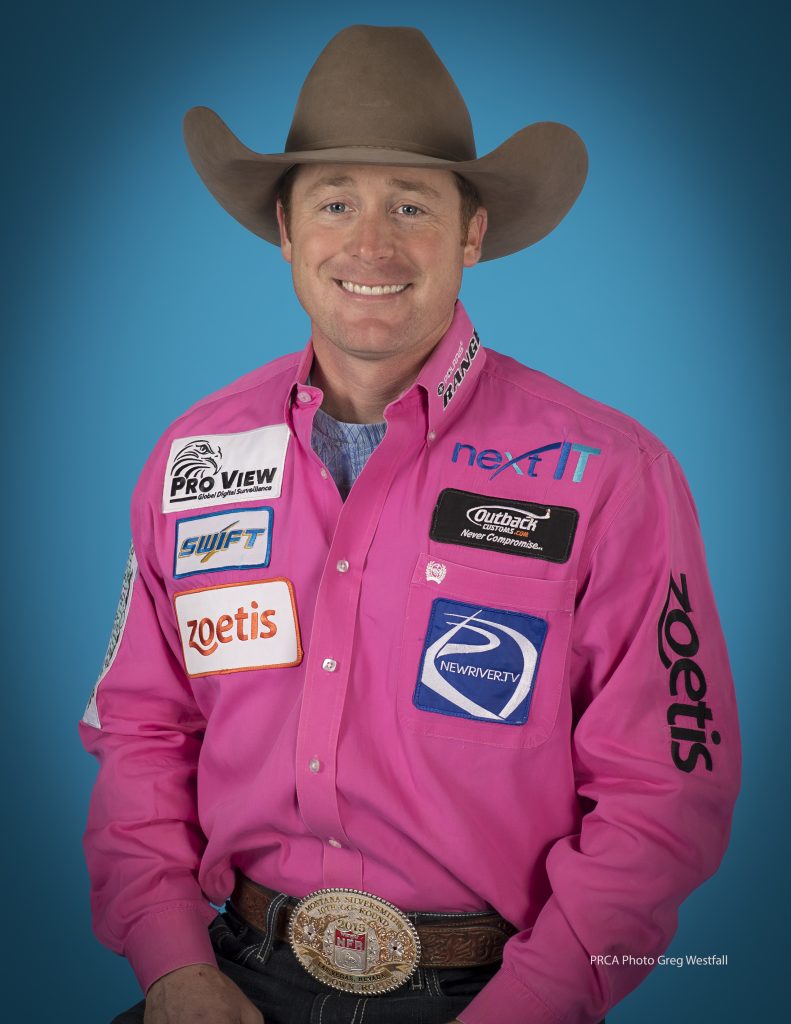
Growing up, I was a cowboy. My mom and dad got divorced when I was really young. I was raised between both households until I was 10, and then I moved in with my dad full-time.
When I was with my dad, we would ride horses pretty much [all day, every day]. And when I was really little, I didn’t want to be a rodeo athlete—I wanted to be Spider-Man, and then I wanted to be a Navy SEAL.
Later in life I thought, Well, I can make money with this rodeoing stuff. This is gonna work out. So then I [became] really dedicated with the rodeo stuff from about twelve [years old] on.
Shea: My dad is an eight-time Australian champion rodeo athlete. He rode bulls and bareback, so he was that all-around champion.
From as far back as I can remember, we lived on the road. So at a young age, I was living on the road, basically living the same life our daughter lives with us, traveling from rodeo to rodeo. My mum is also a barrel racing champion. She’s won several titles in Australia, as well.
I think I won my first rodeo when I was six years old—junior event, of course. And then ever since, I’ve ridden horses. It’s definitely something that came naturally to me [since] I was born into a rodeo family.
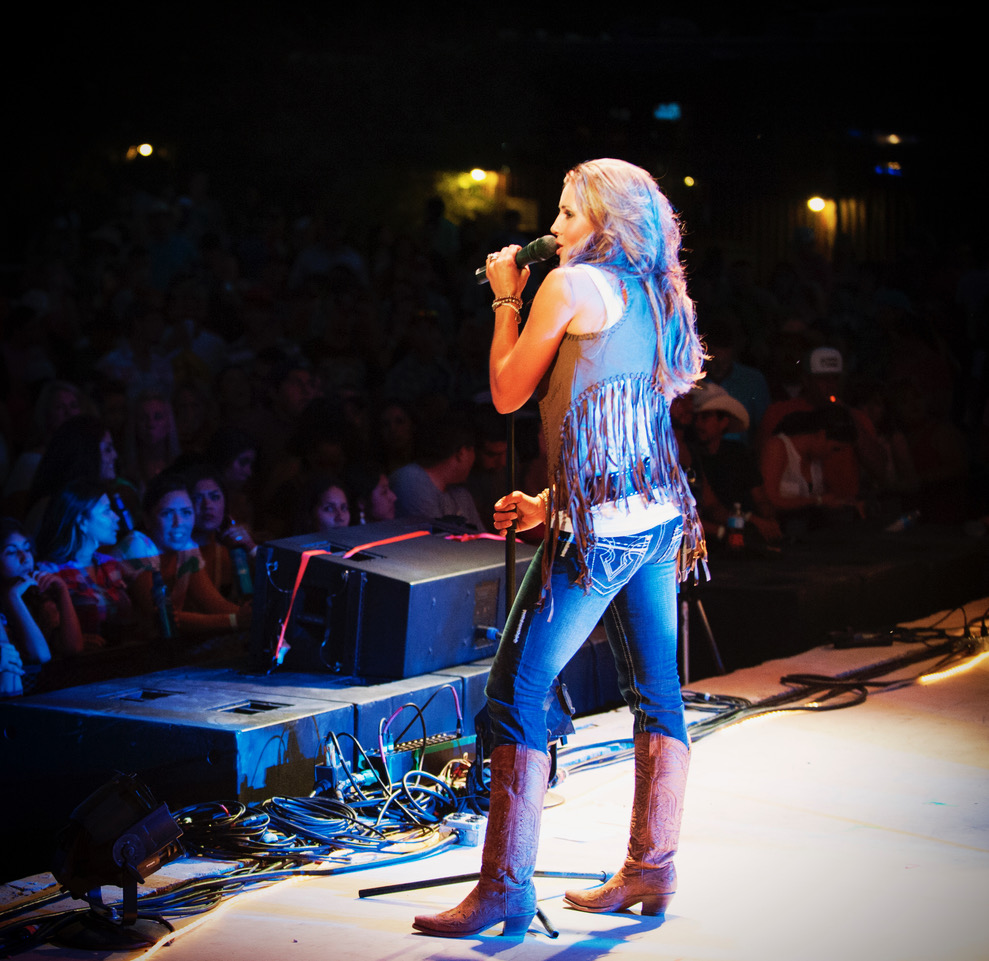
Music came through rodeo, being at rodeos, hearing all the country music songs that were played. My parents lived in the US when I was nine, and that was when there was Reba and Garth Brooks and Tim McGraw and all those amazing artists. The amount of miles that we travelled, we listened to a lot of cassettes back then. So that was where my love for music came from.
Tyson: When I left the ranch, I had my first season pro tour. I was 19 years old.
I had won pretty much everything in high school and amateur ranks, and I thought I would be the next hotshot, on the road, but I didn’t really know what “the road” meant. I didn’t realize that you leave home for eight months a year and you don’t come home at all. And so it took some major adjusting.
I had a terrible first season. I lost my entire life savings, which was a pretty big upset to me. I felt like I was a failure to my dad, and my family, and everybody that believed in me. And I actually quit. I came home, and I started a welding business. I did that for a few years and then I went back to rodeoing. I’d saved and saved and saved, and then I spent my entire life savings again—except this time when I spent my life savings, I had found credit cards too. I maxed out my credit card at about $20,000. I wasn’t at zero as the first time—I was actually below zero because I had to pay those credit cards back.
Long story short, I stayed hooked and started winning and figuring it out. There’s a big learning curve, and I’d lost everything I had twice. I was living in the backseat of my truck, just rodeoing around. I’d bum showers from different people at a rodeo, if they had a trailer or something, and it’s not something that I ever want to go back to. It was tough.
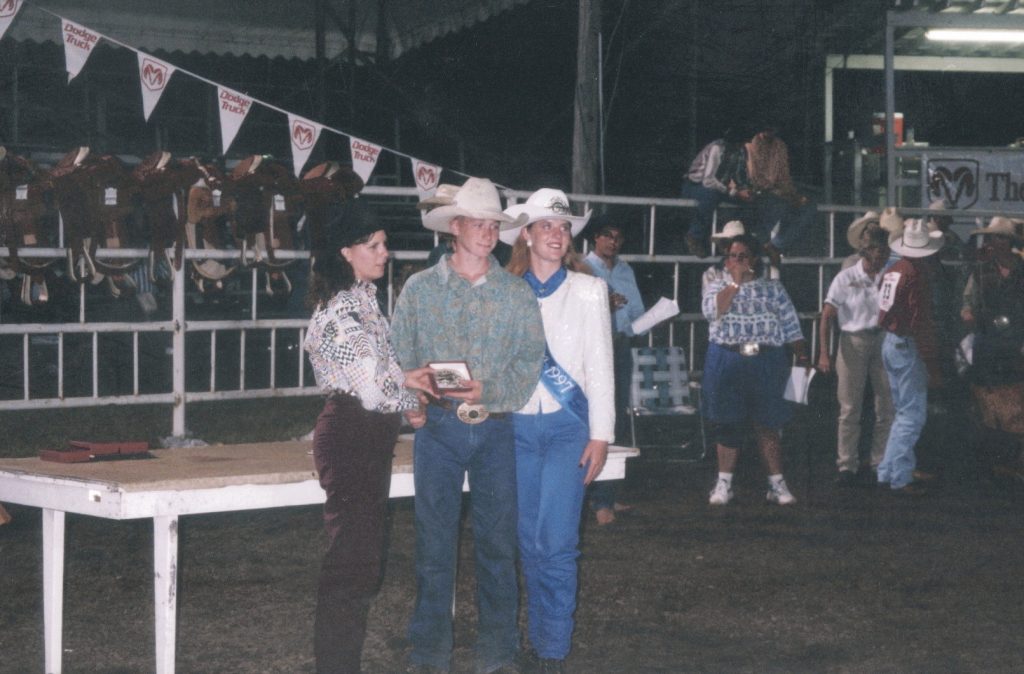
Slowly I began to win. I started traveling across Canada and the US. I was the first American to win a national championship in Canada, and then I started making the National Finals. And a few years later, I met this beautiful lady right here.
Shea: When we met, I knew who he was. Our recollection of the meeting is a little different, but it doesn’t matter—only that we ended up together.
I mean, you can tell it, if you want.
A Cowboy Meets a Country Singer
Tyson: I [saw Shea] at Houston Rodeo in 2010, and I was just like, Wow. Who is that girl over there?
Shea: Short version today.
Tyson: Okay, I’ll give the short version.
And immediately, it was like God shot down a ray of light on her and the wind blew her hair back. I thought, Man, I’ve got to talk to her.
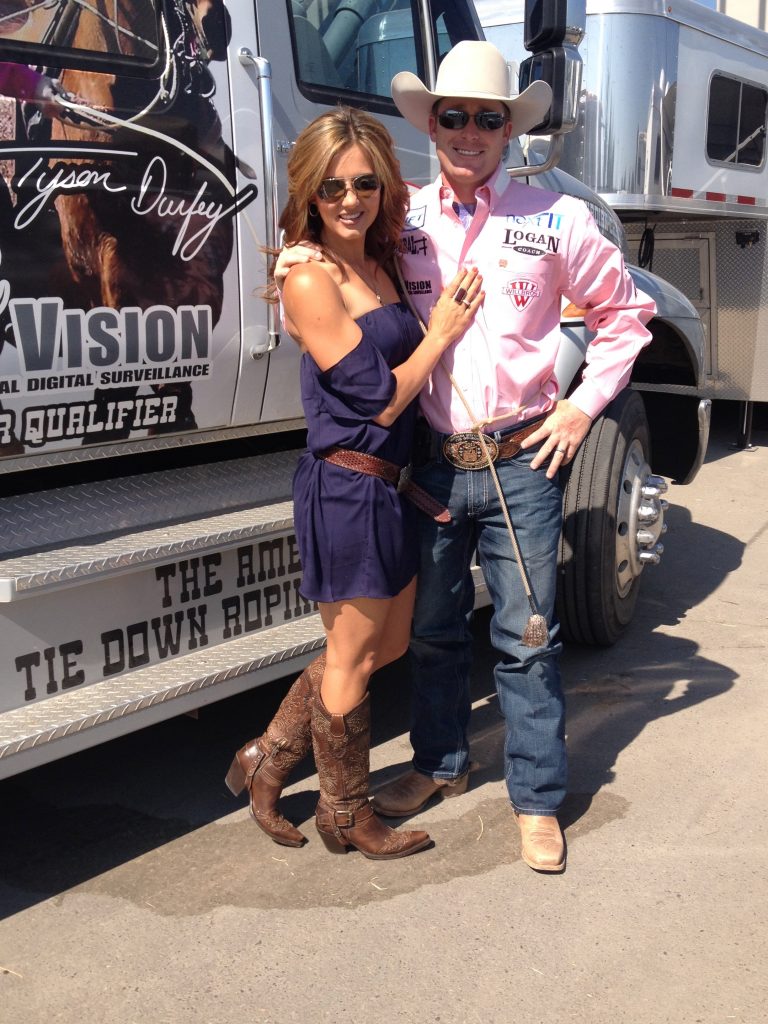
I walk over there and I’m like, “Hi, how are you?”
And she says like, “Fine, thanks,” in her Australian accent, which made it even better. Not only was she beautiful, but then she had an Australian accent.
I knew immediately at that moment I was gonna marry her.
The next day, she sent me a Facebook message just saying, “Nice to meet you.” I took that as an open door policy to really get in there. I asked for her phone number and to go out on a date pretty much every time we messaged for . . . a year, maybe?
Shea: He’s very persistent, and he kept asking for my phone. He would write a message, and I’d answer everything but the phone number.
I was living in Nashville. I was singing. I was on a radio tour. I had a song out on the radio. I mean, the last thing I want to do is be tied down. But I definitely didn’t say no to Tyson because I loved his friendship, and I wanted to have him there for when I felt like I was getting more settled down.
So I actually needed tickets to the rodeo one day, so I reached out to Tyson and he agreed to give me the tickets as long as I would go to dinner with him. So I bargained and said, “Well, how about breakfast?”
Tyson: Yes, so no dinner.
Shea: We had breakfast, and then we just kept in touch for about the next six months or so.
My dad’s an Australian champion rodeo athlete, so I said, “If you want to date me, you’re going to have to ask my dad.” So when my parents came over for the National Finals, he asked my parents if he could date me. And then the next year at the National Finals, he asked if he could marry me.
Tyson: Not to her, I asked her parents.
Shea: Yes. And then we got engaged on New Year’s Eve in New York.
Tyson: I had planned a trip to New York on New Year’s Eve, and the plan was to propose in Times Square during the ball drop. I didn’t realize there are, like, a million people there. In the movies, there’s tons of room. Come to find out, you have to be there 24 hours ahead and you have to stay there [to save your spot]. So that wasn’t going to work for me.
We ended up going to Central Park by the Bethesda Fountain, and I started into my spiel about why I want to marry her three minutes before the ball dropped. I ask her to marry me, she said yes. And one second later, the first firework goes off. Impeccable timing. It was God’s timing—I’m not that good.
Shea: So romantic.
Growing Together and Growing with God
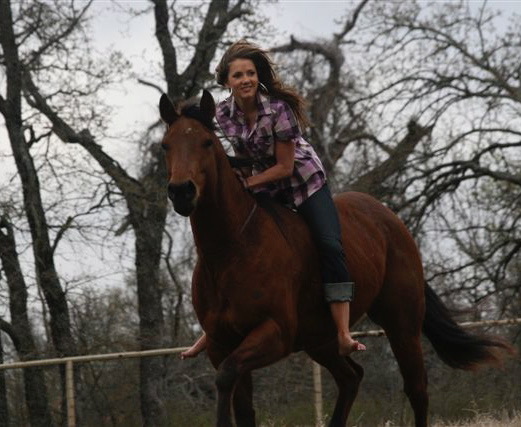
Shea: My parents weren’t raised in a Christian household, but they both got saved when they were around 23. In Australia, the rodeo industry is not as Christian-based as it is in the US. They definitely had to stand up for their beliefs, and it wasn’t the cool thing at the time.
But I’ve been blessed because I’ve always been raised in a Christian household. From as far back as I can remember, we were in church and Sunday school. That’s always been very important to me, even with our daughter, to make sure she has a good foundation and knows the Bible stories and things like that because that’s definitely been a part of my life.
I knew at the time I met Tyson, he wasn’t as strong in his Christian walk as I was. I had dated some guys in the past, and I had thought, You know what? I can just change them, or, It’s okay, they’ll become a Christian. But I always went back to the scripture my parents put in me as a young girl: “Don’t be unequally yoked.”
Tyson: My relationship with Jesus, my Lord and Savior really started . . . I [saw] those seeds getting planted when I was really little.
My mother is a devout Christian. She had sown those seeds in that foundation so deep into me that I didn’t even know that they were there.
[I grew up in] kind of a tough environment because when I lived with my mom, we would go weeks without electricity. We would never have food in the house. I would sneak to other kids’ houses just so I could have something to eat.
I was running with the wrong kids. I was skipping school, every learning disability class. And my mom was a really big optimist that [said things like], “We’re going to be okay, we’re going to make it.” ‘Course, she was a single mother with two kids, trying to raise them in a heavily urban environment with a lot of distractions. She was just struggling and trying.
As we got older, my brother and I got too wild for my mom. She couldn’t handle us anymore, so she sent us to live with our dad on the ranch. And when I went to the ranch, values—human values—were the highest thing that you could do. If you shook a man’s hand, that’s the way it’s going to be. If you told him it was going to be some way, it was going to be that way.
But we would tell dirty jokes. There were whiskey and beer every single day. There were women coming and going. It was a very polarized environment.
It wasn’t until I left and got out in the world that I realized, Okay, these things I know as a young man aren’t things that are going to propel me to the future that I want.
Shea asked me in June 2011, “Are you a Christian?” And I really wanted Shea. I had that Christian base, but it was a long ways back.
And I was like, “Yeah, I’m a Christian.”
Shea: I’m pretty sure you told me yes.
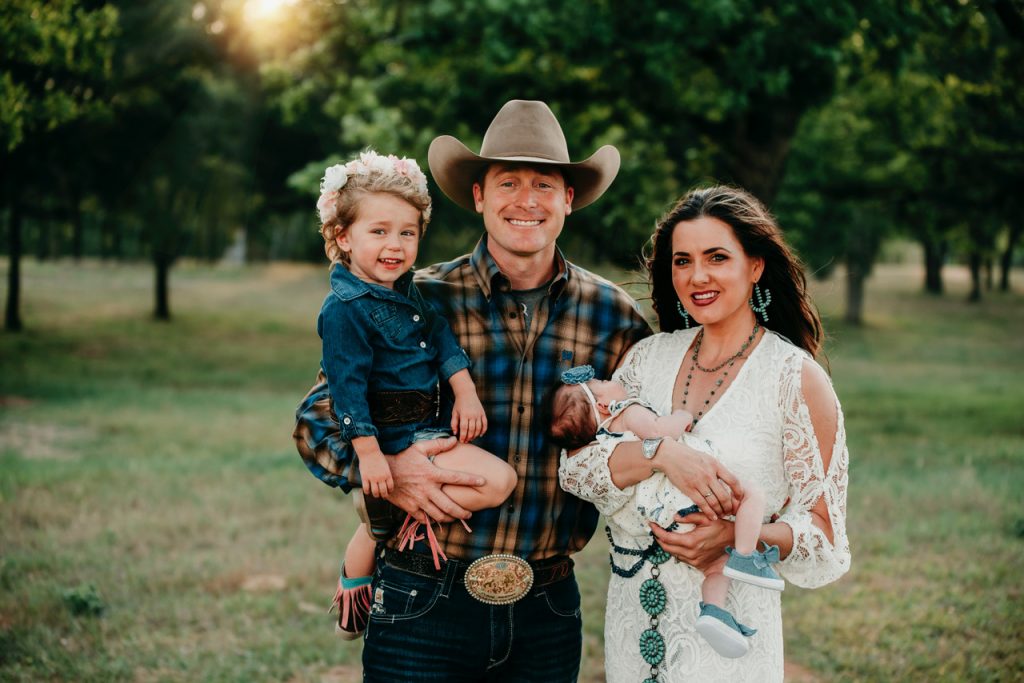
Tyson: I had this Bible in the dash of my truck that was given to me by the people who later baptized me. So I [started to open] the Bible every day, and I just started reading it—it was a New Testament Bible. I’d read about Jesus, and I’m reading through James and it’s just so much wisdom. It just blew my mind, like, James 1:19: “Truly I tell you, every man should be quick to listen, slow to speak, and slow to become angry.” And I was the exact opposite. I didn’t want to listen. I wanted to speak, and I got angry because I’m an Irish redhead who likes to fight.
And then it got ahold of me. It grabbed me during the same time I was getting to know Shea. And when I go in, I go all in. I don’t do anything at 50 percent. I go in 100 percent with whatever I decide to go after. I picked up the Bible, and it grabbed hold of my heart. It was just that transition, and it was truly amazing for me.
“I go in 100 percent with whatever I decide to go after. I picked up the Bible, and it grabbed hold of my heart. It was just that transition, and it was truly amazing for me.” – Tyson Durfey
Shea: I remember when we were we were dating, I had gotten the Jesus Calling book and I said to Tyson, “You need to read this.” And I think he was travelling, so I was like, “You know what? Download the app onto your phone so you can read it every day.”
Tyson: We would read it together every night.
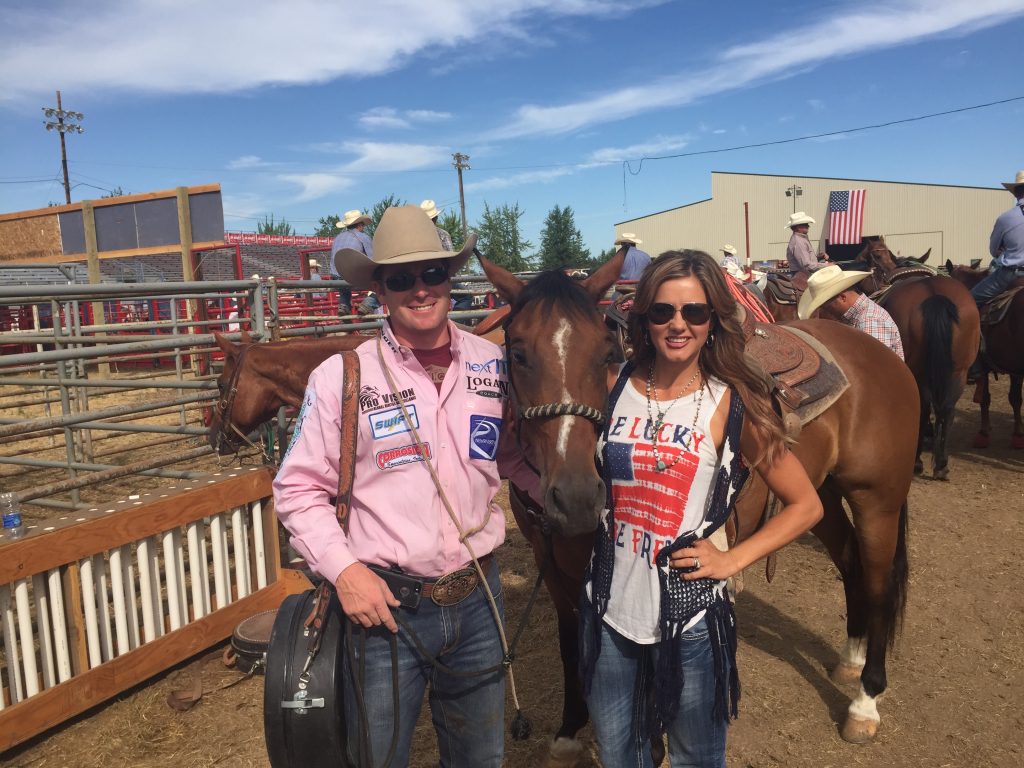
Shea: And sometimes I’d skip ahead or skip back and just kind of see what was on my heart that day.
I have hard copies of this book. It’s on my phone, in my apps. And I just love how worldwide it is, because once I knew about it, I introduced my mom to it. There were some people in Australia who weren’t saved, and she told them about it. It’s helped so many people in life.
Tyson: That is so true.
Where You Don’t See the Way, God Does
In 2016, I won the World Championship [at the National Finals Rodeo].
It was the worst year leading up to qualifying for the National Final. I mean, everything that could go wrong went wrong. We blew up two trucks on the road.
Shea: Brand-new trucks, too.
Tyson: Generator problems left and right, constantly outside the top 20.
Shea: I was a lot of months pregnant at the time.
Tyson: Very pregnant—like, very pregnant—and it was just so tough. At one point, I was ready to give up and go home. I was ready to be done.
Long story short, I ended up qualifying for the National Finals in the 14th position. They take 15 to the National Finals Rodeo.
Leading up to the last few final days of competition, I would spend 30 minutes reading my Bible, 30 minutes stretching in a dark room. Then I would take a shower, and I would go get ready to compete.
On the seventh go-round of the National Finals, I am in the shower. I get done in the shower and put the towel on my face, and the Lord just spoke to me immediately, and He said, “I am with you.”
I’m getting goosebumps right now just talking about it. And I just wanted to fall down on my knees and cry because I was so [shaken] by it. When you hear the word of the Lord that vivid and that audible, it shakes you to your core, it really does.
“When you hear the word of the Lord that vivid and that audible, it shakes you to your core, it really does.” – Tyson Durfey
And from that moment coming out of the shower, I knew I was going to be the world champion, even though the math didn’t look like it. The numbers didn’t look like it. There was literally almost no way that I could be the world champion because I was so far down in the pack. But where you don’t see the way, God sees the way. It’s the truth.
“Where you don’t see the way, God sees the way.” – Tyson Durfey
I went on to win the World Championship coming from nearly the very last person in the pack.
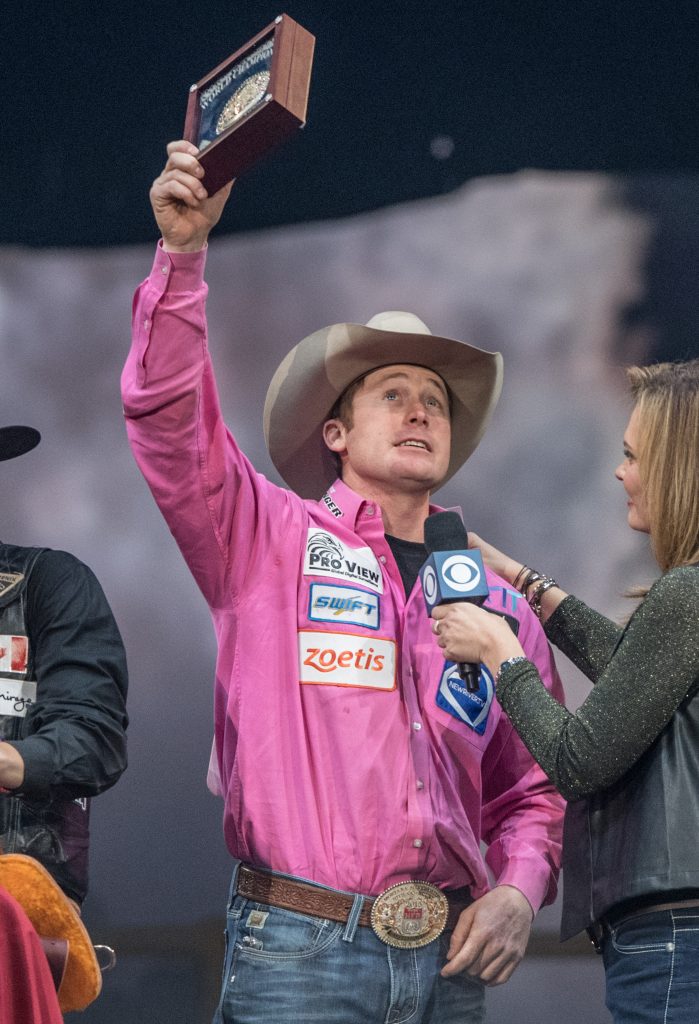
If you were to point a linear trajectory from where I started to where I ended with my ability, there would be a straight line to that point, right? And then from that point, there’s a dotted line leading to the World Championship. Where I was capable of winning a World Championship was from this dot to that dot, where the line was connected—and where the line was not connected is where there were dots, that’s where my faith-filled in the space, where I wasn’t good enough. That’s where my faith and my belief in my Lord filled in the gap to get me to the World Championship.
And that’s what God will do in your life. That’s what Jesus will do for you. It’s important to remember that if you can’t do it, God will fill in the gap.
“It’s important to remember that if you can’t do it, God will fill in the gap.” – Tyson Durfey
Narrator: To get the latest on Tyson’s life in and out of the arena, follow him on social media. You can find updates on Shea’s music at sheafisher.com.
Narrator: Stay tuned for our interview with former professional bull rider Cody Custer after a brief message about a free offer from Jesus Calling!
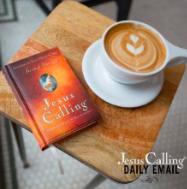
Want a daily reminder that we can have hope, peace and joy each day in Jesus? Now it’s as easy as opening an email. The Jesus Calling Daily Email brings you a thought from the Jesus Calling family of devotionals every day. Brighten up your inbox with this little reminder and take a minute to connect with God during your day. To sign up to get your free, daily thought from Jesus Calling, please visit Jesus Calling.com/daily-email.
Narrator: From the time he was a little boy, Cody Custer knew he would be in the rodeo. Even through a series of tragic events that happened when he was young, Cody was still able to succeed in western sports, and took many prizes before retiring after 20 years as an athlete. As Cody looked toward life after his rodeo career, another unexpected tragedy forced him to reevaluate everything he held dear.
Cody Custer: So my name’s Cody Custer. I rode bulls professionally from 1983 to 2003.
I started riding calves when I was five, so most of my life I was in bull riding.
“A Reason in the Middle of What Happens”
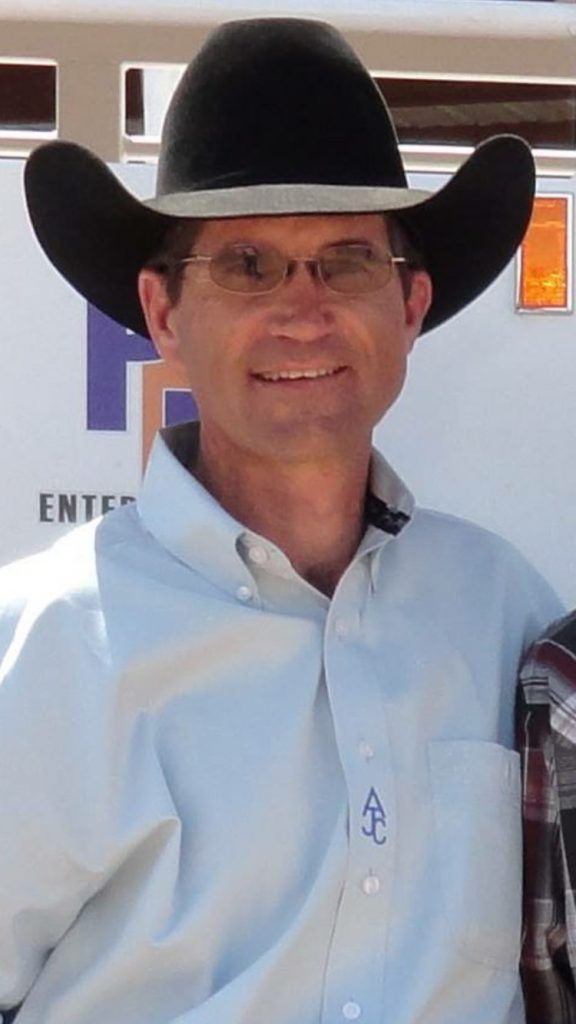
In 1972, my brother and sister died in a carbon monoxide poisoning.
It led us away from anything to do with God, let’s put it that way. There was a lot of partying going on around our crew, and I got into it. Heck, at eleven years old, I was smoking pot.
At that time, Mom and Dad were partying and there was a lot of stuff going on that probably wasn’t the best for our situation. But really behind it is just . . . hiding. They were just trying to hide the pain, you know.
And so the church we went to put a lot of pressure on them in 1972, after the kids died, and they just left because there was so much pressure.
“I don’t know if everything happens for a reason, but I believe there’s a reason in the middle of what happens.” – Cody Custer
My mom grew up ranching and rodeoing, and so I went on my first roundup when I was 4 years old. I don’t know if I’m much of a cowboy, but I’ve been around it a whole lot, and I’m kind of savvy to some of the [cowboy] things, just because I grew up around it. Gosh, we were at a rodeo almost every weekend.
In 1979, life was pretty good. My dad was a silversmith who built really nice buckles, and my mom, she worked with him and stuff. And he broke his neck in a horse accident that year. Dad was paralyzed, and it just put us in a different position. Where he was always a physical guy, now he had to rely on God.
“I don’t believe God ever takes His hand off any of us, no matter what we’re doing, no matter what’s going on in our lives.” – Cody Custer
I kind of fell in love with bareback riding, which is another event in rodeo. And through high school and starting into a professional level, that’s where I was really focused. I still rode bulls and I had success [with that], but I really was thinking about pursuing bareback riding.
When I got to the level of professional, the quality of the stock got a little bit stronger, and so I found out that I didn’t ride bucking horses as [well] as I rode bulls. So the bullriding kind of took over at that point, and I was able to make a living with riding bulls starting in 1985.
In ‘86, I ended up just outside the top 20, or maybe just inside the top 20. [At any rate], I didn’t make it to the National Finals, which is the top 15.
I got to go out to the National Finals and watch from the stands, and I saw guys in the arena I thought I rode better than. And so it was just it was a kickstart to the new year, and it made me get disciplined and get focused on what I was wanting to do.
1987 through 1992, I qualified for the National Finals consecutively, and 1992 was the year everything fell into place and I had great success. I mean, I set an earnings record that year.
The Heart-Wrenching Loss of a Son
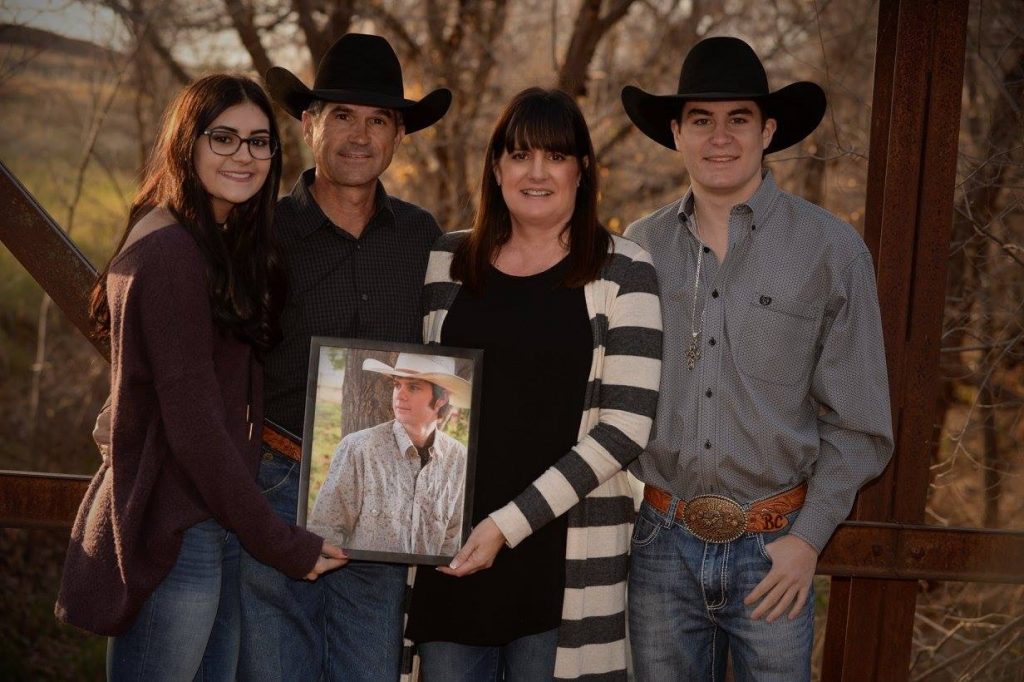
In 1993, shortly after I won the world title, my wife gave birth to our first boy, Aaron, on March 7th. So that was awesome, just to be able to bring a life in the world and get to know him.
[After Aaron was born], there were five years in a row I had injuries that cost me the year. I’d always based my success on how well I did rodeoing, I was still riding [well], but I was having these injuries and stuff [that kept me from competing at a high level].
But looking back on it, that was a time in my life when a lot of stuff was developed in me that comes to life now. I got to see my boy grow up. I got to see the first five years of my boy’s life. Looking back on all of it, I really wouldn’t change things. I see God all over the middle of it, on top of it [because] I think people get too wrapped up in circumstances and forget [success is] not the end-all.
”I think people get too wrapped up in circumstances and forget [success is] not the end all.” – Cody Custer
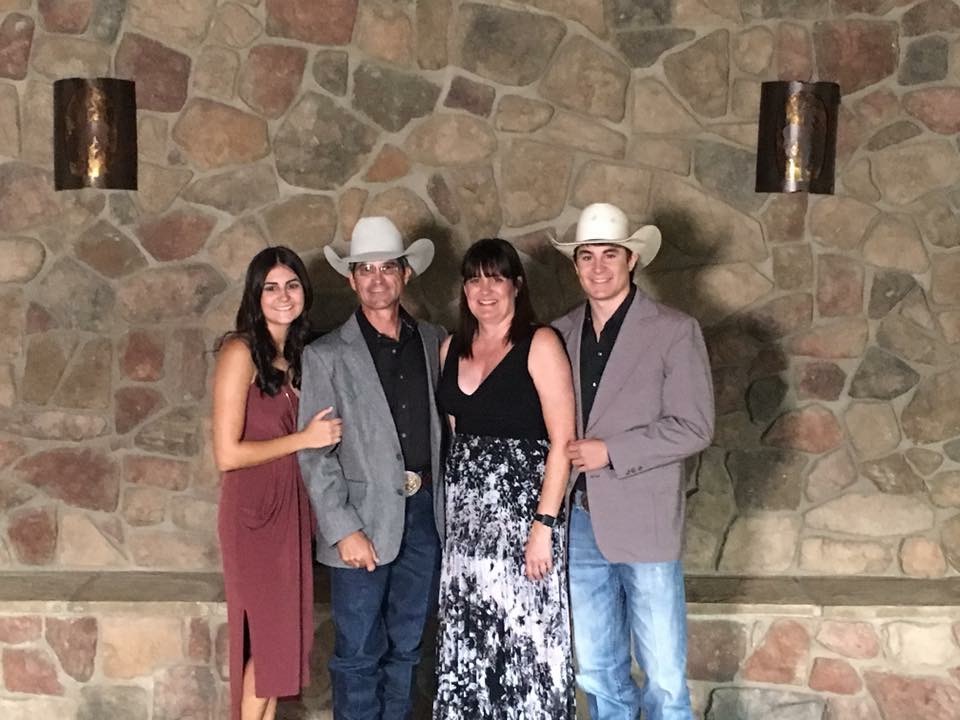
I went on to have a good career. I finished riding bulls in 2003. I’m not riding bulls anymore, and I’m trying to find out really figure out exactly where I fit in the world because I’m not a bull rider anymore.
So we moved to Oklahoma in 2007, and I quit my position with the PBR and just stayed home quite a bit. And my boy [Aaron], he became a man in the summer of 2011. He was rodeoing, bought his own trailer and was paying his way that way. He decided to go to college in Weatherford, Oklahoma.
The day before classes started, he and his buddies were coming home. They had a rodeo meeting that night—[that’s what] kids will do at 2 a.m.—but they were on a road that none of ’em knew. It was a straight road with a jagged curve in it. The boy driving, who survived the wreck, told me he had put his dims on ’cause there was a car that went by, and he never put his brights back on . . . and he never saw the corner until they were in it. He overcorrected, and he went off [the road].
My son and Drury both died in that car wreck.
I used to get up every morning and read my Bible and talk to the Lord. I was up that morning, and a bang came on the door. I opened the door, and I’d seen the scene before in a dream. It was a police officer and my pastor and his wife there. And I knew. They didn’t have to tell me what happened.
Probably the worst thing that could possibly happen to a person is losing a child. Aaron, he was our first kid. There’s a lot of first experiences we had with him, and it was a pretty rugged time. I can’t say I don’t have a rougher time with it now that I did the first few years. It’s been [eight] years since Aaron went back to the Father.
But in the aftermath of that, we had so many people who would call us and tell us what Aaron meant to them, people we didn’t know. I mean, he met so many people, he never knew a stranger.
Anyway, I learned a lot. I learned a lot more from my boy than I ever thought I did. He just taught me a lot of stuff.
“I learned a lot more from my boy than I ever thought I did.” – Cody Custer
“There’s no cookie cutter way to grieve.”
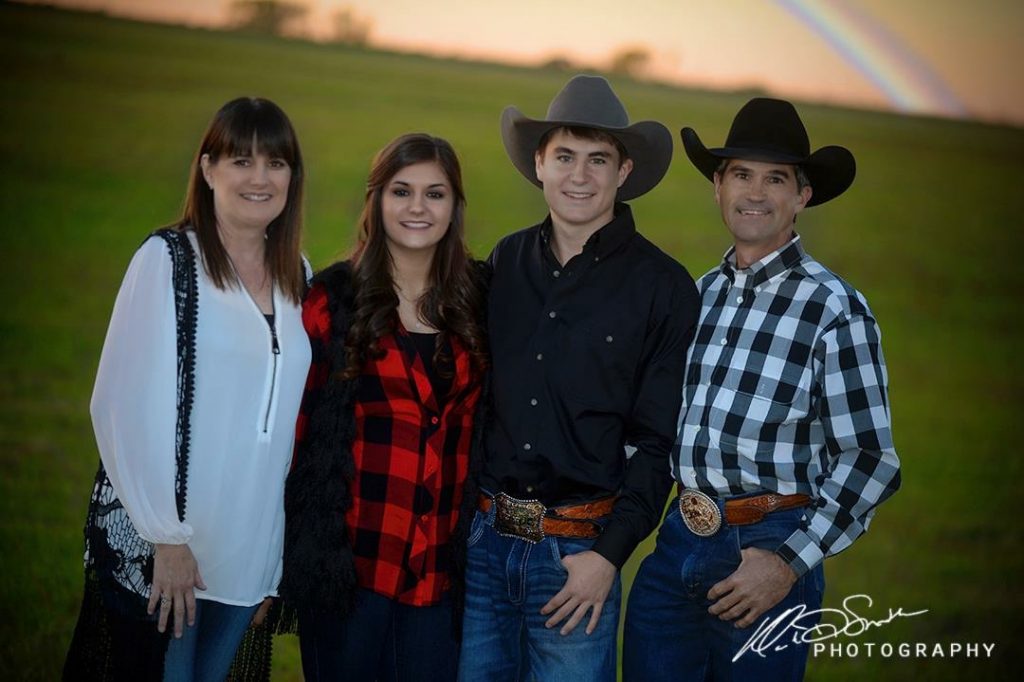
Somebody gave me this Jesus Calling book, [and] I stayed with it fairly consistently.
The morning we got the news that Aaron had passed, I hadn’t read the devotional that day. So for a few days, I was kind of in a fog there. But I went back and looked, and it was August 16, 2011, when Aaron was killed, somewhere around 2:30 or 3 in the morning.
I’ll just read August 16. It says, “Meet Me in the early morning’s splendor.” That’s the first line [of the devotional]. So to me, that’s the way my boy went back in the presence of the Father, [during] the early morning splendor.
[Jesus Calling] is just a book with words until the Spirit hits it, and then it’s life. And so to me, it just gave me a little bit of a rest and a peace that [Aaron] is back with the Father, where he belongs, where we’re all headed.
“[Jesus Calling] is just a book with words until the Spirit hits it, and then it’s life.” – Cody Custer
Everybody grieves their own way. Grieve how you grieve. There’s no there’s no cookie cutter way to grieve. I’m no counselor, but I have been through some stuff. Just go ahead and do it the way you’re going to do it. But don’t back down. Don’t give up. Keep moving forward, and you can’t lose that way.
“Everybody grieves their own way. Grieve how you grieve. There’s no there’s no cookie cutter way to grieve.” – Cody Custer
Narrator: You can learn more about Cody’s faith and his riding clinics at codycuster.com.
Narrator: If you’d like to hear more stories about learning to trust God when life gets tough, check out our interviews with NFL Hall of Fame wide receiver Tim Brown and Super Bowl Champion quarterback Jeff Hostetler.
Narrator: Next time on the Jesus Calling Podcast, we speak with pastor Jonathan Pitts. When we talked with Jonathan, he reflected on some of the most important lessons he learned in his 15-year marriage to his wife, author Wynter Evans Pitts, who died suddenly at the age of 38.
Jonathan Pitts: That’s the beautiful thing about marriage. I think there’s a commitment to love and sacrifice and to lay down for each other that you’re always going to be growing, and there’s always going to be something else to lay down. So my continued encouragement to you, year by year, is [marriage is] never perfect, but if it’s intentional, it’s always progressional.


One thought on “Trusting God to Fill the Gap: Rodeo Stars Tyson Durfey (w/ wife Shea Fisher) and Cody Custer”
Comments are closed.